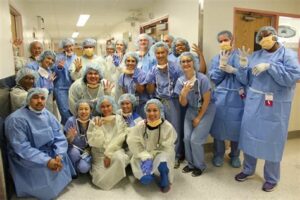Table of Contents
A Hospital Scribe Volunteer is a valuable asset to any healthcare facility, providing essential administrative support to medical professionals. Working closely with doctors and nurses, a scribe volunteer helps with documentation, record-keeping, and data entry tasks. This role requires strong attention to detail, excellent organizational skills, and the ability to maintain confidentiality. Joining as a Hospital Scribe Volunteer offers a unique opportunity to gain firsthand experience in the medical field while making a meaningful impact on patient care.
Hospital Scribe Volunteers play a vital role in the fast-paced world of healthcare. From documenting patient histories to transcribing medical reports, these dedicated individuals ensure that every detail is accurately recorded. But their impact goes beyond just paperwork; they serve as the eyes and ears of physicians, capturing the intricate web of information that unfolds within hospital walls. With their keen observational skills and expert multitasking abilities, Hospital Scribe Volunteers are the unsung heroes who help streamline the healthcare process. In this article, we delve into the captivating world of these remarkable volunteers, shedding light on their invaluable contributions and the transformative effect they have on patient care.
Introduction
In the fast-paced and demanding environment of a hospital, doctors and nurses often find themselves juggling numerous responsibilities simultaneously. To alleviate their workload and ensure accurate documentation, hospital scribe volunteers play a crucial role. These dedicated individuals offer their time and expertise to assist healthcare professionals in capturing patient information efficiently and effectively.
The Role of a Hospital Scribe Volunteer
A hospital scribe volunteer serves as a valuable asset within a medical team. Their primary responsibility is to shadow doctors and nurses during patient encounters, documenting relevant information in real-time. By focusing on recording details such as medical history, symptoms, diagnoses, and treatment plans, scribes enable healthcare providers to concentrate fully on delivering quality care.
Training and Qualifications
Prior to becoming a hospital scribe volunteer, individuals undergo comprehensive training. This preparation equips them with the necessary knowledge and skills to fulfill their role effectively. Scribes learn about medical terminology, documentation protocols, and privacy regulations. They also receive instruction on using electronic health record (EHR) systems to ensure accurate data entry and retrieval.
Benefits for Healthcare Professionals
The presence of a hospital scribe volunteer offers numerous advantages to doctors and nurses. By having a dedicated individual responsible for documentation, healthcare providers can focus more intently on their patients, leading to improved overall care quality. Scribes also help reduce administrative burdens, freeing up valuable time that can be redirected toward direct patient interaction and critical decision-making.
Enhanced Patient Experience
With a hospital scribe volunteer present, patients can experience a more streamlined and personalized healthcare journey. By capturing detailed information during consultations, scribes ensure that nothing goes unnoticed. This attention to detail enables doctors and nurses to make well-informed decisions promptly, ultimately leading to better patient outcomes and higher satisfaction rates.
Valuable Learning Opportunity
For individuals aspiring to pursue a career in healthcare, volunteering as a hospital scribe offers a unique learning experience. Scribes have the opportunity to observe medical professionals firsthand, gaining valuable insights into various specialties and procedures. This exposure can solidify career choices and provide a foundation for future educational endeavors.
Building Strong Communication Skills
In addition to medical knowledge, effective communication is crucial in the healthcare field. Hospital scribe volunteers develop exceptional interpersonal skills by interacting with patients, doctors, and nurses on a daily basis. They learn to communicate clearly, maintain professionalism, and adapt to different communication styles, thereby honing essential skills for their future careers.
The Impact of Technology
As healthcare continues to evolve, so does the role of a hospital scribe volunteer. The integration of technology, such as electronic health records, has transformed the way information is captured and stored. Scribes are at the forefront of this digital revolution, proficiently navigating EHR systems and ensuring accurate and secure data entry.
Contributing to Research and Education
Hospital scribe volunteers also play a vital role in advancing medical research and education. By diligently documenting patient encounters, they contribute valuable data that can be used for research purposes. Furthermore, scribes may participate in educational initiatives, such as training programs or workshops, sharing their experiences and knowledge with aspiring healthcare professionals.
Making a Difference
Volunteering as a hospital scribe allows individuals to make a tangible difference in the lives of patients and healthcare providers. By offering their time and expertise, scribes contribute to the smooth functioning of a hospital, ultimately enhancing patient care and outcomes. Their dedication and commitment exemplify the selflessness that underpins the spirit of volunteering.
The Growing Phenomenon of Hospital Scribe Volunteer Programs
With hospitals seeking to optimize patient care and streamline their operations, the role of hospital scribe volunteers is gaining significant popularity. These valuable volunteers, well-versed in medical terminology, work closely with healthcare professionals to meticulously document patient encounters and medical records, ensuring accurate and comprehensive information for optimal continuity of care.
On the Frontlines of Medical Documentation: Assisting Healthcare Providers
In the midst of a chaotic healthcare environment, hospital scribe volunteers diligently assist healthcare providers by charting patient histories, physical examinations, diagnostic procedures, and treatment plans. Armed with remarkable organizational skills and an eye for detail, these volunteers enable medical professionals to focus more on delivering quality healthcare, unburdened by the often time-consuming task of documentation.
Bridging the Gap: Enhancing Communication and Coordination
Hospital scribe volunteers play a vital role in enhancing communication and coordination amongst healthcare teams. By efficiently relaying important patient information to various team members, these volunteers help ensure that everyone is well-informed during every stage of treatment. Their presence guarantees a smooth flow of information, allowing for more effective decision-making and reduced medical errors.
Preserving the Human Touch: Facilitating Physician-Patient Interaction
In a medical landscape where digital documentation is becoming increasingly essential, hospital scribe volunteers assume the responsibility of capturing patient narratives accurately without disrupting the physician-patient bond. By unobtrusively documenting conversations, symptoms, and concerns during consultations, these volunteers empower healthcare providers to give their undivided attention to patients, fostering a more meaningful doctor-patient relationship.
Essential Training: Equipping Volunteers with Medical Knowledge
Hospital scribe volunteer programs understand the significance of equipping volunteers with adequate medical knowledge to fulfill their duties effectively. Through specialized training, volunteers gain a comprehensive understanding of medical procedures, terminologies, and ethical considerations, ensuring they can accurately interpret and document complex medical information.
Confidentiality and Privacy: Upholding Ethical Standards
Respect for patient privacy and confidentiality is a paramount aspect of hospital scribe volunteer programs. Volunteers are trained in strict adherence to ethical standards and patient rights, maintaining confidentiality with the utmost diligence. This commitment to privacy fosters trust between patients, healthcare providers, and the volunteer, ensuring a secure and respectful environment for all.
An Invaluable Learning Opportunity: Career Exploration in Healthcare
For aspiring healthcare professionals, hospital scribe volunteer programs offer a unique and invaluable learning opportunity. Through firsthand exposure to patient care settings, volunteers observe medical practices, gain insights into various specialties, and better comprehend the complexities of healthcare delivery. This experience can guide their career choices and fuel their passion for making a difference in the lives of patients.
Making a Lasting Impact: Empathy and Compassion in Action
Above all, hospital scribe volunteers make a lasting impact through their empathetic and compassionate approach. By attentively listening to patients, providing emotional support, and relaying their concerns to healthcare providers, these volunteers contribute significantly to the overall well-being and healing process of patients. Their presence helps create a healthcare environment that is not only technically proficient but also emotionally uplifting.
Point of View: Hospital Scribe Volunteer
As a Hospital Scribe Volunteer, I am dedicated to providing support and assistance to healthcare professionals in their day-to-day tasks. Through my role, I have the opportunity to observe and learn about the medical field while contributing to patient care. Here is a journalist-style breakdown of my experiences:
1. Introduction:
Being a Hospital Scribe Volunteer is both challenging and rewarding. It allows me to immerse myself in a fast-paced environment where I can witness first-hand the critical work carried out by doctors, nurses, and other medical staff.
2. Observational Skills:
As a keen observer, I have developed a keen eye for detail and an ability to accurately document medical procedures, conversations, and patient interactions. This skill is essential in ensuring accurate medical records and facilitating effective communication among healthcare providers.
3. Communication and Teamwork:
Working closely with healthcare professionals has strengthened my communication and teamwork skills. I have learned how to effectively communicate with doctors, nurses, and support staff, ensuring that the information I capture is accurately conveyed and understood.
4. Patient Care:
While my primary role is to assist healthcare providers, I also understand the importance of patient care. I have witnessed the impact that a compassionate and attentive demeanor can have on patients’ well-being. By actively listening and offering support, I aim to provide comfort during their hospital stay.
5. Adaptability and Multitasking:
Working in a hospital environment requires the ability to adapt quickly to changing situations and handle multiple tasks simultaneously. As a Hospital Scribe Volunteer, I have become adept at managing my time efficiently and prioritizing tasks to ensure that I can assist medical professionals effectively.
6. Ethical Considerations:
While my role as a Hospital Scribe Volunteer grants me access to sensitive patient information, I understand the importance of maintaining confidentiality and adhering to ethical guidelines. I treat all patient information with the utmost respect and ensure its secure handling.
7. Learning and Growth:
Being a Hospital Scribe Volunteer has provided me with invaluable learning opportunities. From medical terminology to witnessing various medical procedures, I continuously expand my knowledge base. This experience serves as a stepping stone towards my future career goals in the healthcare field.
In conclusion, as a Hospital Scribe Volunteer, I strive to contribute to the healthcare system while gaining valuable insights into the medical field. Through my keen observation, effective communication, and dedication to patient care, I aim to support healthcare professionals in delivering the best possible care to patients.
Thank you for taking the time to visit our blog and learn about the incredible work of hospital scribe volunteers. These unsung heroes play a vital role in the healthcare system, ensuring that accurate medical records are kept and patients receive the best possible care. As a journalist, it is my privilege to shed light on their invaluable contributions and share their stories with you.
First and foremost, hospital scribe volunteers are passionate individuals who are dedicated to making a difference in the lives of others. Their selflessness and commitment to helping patients and medical professionals alike is truly inspiring. By documenting essential information during patient visits, these volunteers allow doctors and nurses to focus on providing the best possible care without the burden of paperwork. They ensure that medical records are up-to-date, organized, and easily accessible, which ultimately leads to improved patient outcomes.
Furthermore, the role of a hospital scribe volunteer requires excellent communication and interpersonal skills. These volunteers must establish rapport and trust with patients to gather accurate information about their medical history, symptoms, and concerns. They must also collaborate effectively with healthcare professionals to ensure that all relevant details are captured in the medical record. By doing so, they facilitate seamless communication between different members of the healthcare team and contribute to the overall efficiency of the hospital.
In conclusion, hospital scribe volunteers are the unsung heroes of the healthcare system. Their dedication, passion, and attention to detail make them an invaluable asset to any medical facility. By relieving healthcare professionals of administrative tasks and ensuring accurate documentation, they directly contribute to the quality of patient care. We should recognize and appreciate the important role that these volunteers play in our hospitals and clinics. If you have the opportunity, I encourage you to consider becoming a hospital scribe volunteer yourself and join this noble cause.
.
1. What is a Hospital Scribe Volunteer?
A Hospital Scribe Volunteer is an individual who assists healthcare professionals by documenting patient medical information in real-time. They work alongside doctors, nurses, and other healthcare providers to ensure accurate and timely documentation of patient encounters.
2. What are the duties of a Hospital Scribe Volunteer?
– Documenting patient medical history, symptoms, and medications
– Assisting with data entry and electronic medical record management
– Ensuring accurate transcription of doctor-patient interactions
– Collaborating with healthcare professionals to gather necessary information
– Maintaining patient confidentiality and adhering to privacy regulations
3. What skills are required to become a Hospital Scribe Volunteer?
– Excellent communication and listening skills
– Strong attention to detail and accuracy
– Ability to work well under pressure and in a fast-paced environment
– Proficiency in using electronic medical record systems
– Basic knowledge of medical terminology and procedures
4. Is previous medical experience necessary for volunteering as a Hospital Scribe?
No, previous medical experience is not necessary to volunteer as a Hospital Scribe. However, having a basic understanding of medical terminology and procedures can be beneficial in quickly adapting to the role.
5. How can I become a Hospital Scribe Volunteer?
To become a Hospital Scribe Volunteer, you can start by contacting local hospitals or healthcare facilities to inquire about volunteer opportunities. Many organizations provide training programs to equip volunteers with the necessary skills and knowledge required for the role. Additionally, some medical scribe companies offer volunteer positions as a stepping stone towards paid employment.
6. Are there any age or educational requirements to become a Hospital Scribe Volunteer?
The age and educational requirements may vary depending on the hospital or organization offering the volunteer program. Some facilities may have a minimum age requirement, while others may require volunteers to have a high school diploma or equivalent. It’s best to check with the specific hospital or organization for their requirements.
7. What are the benefits of volunteering as a Hospital Scribe?
– Gaining valuable experience in the healthcare field
– Enhancing communication and documentation skills
– Learning about medical procedures and terminology
– Making a positive impact on patient care
– Building professional connections in the healthcare industry
8. Can volunteering as a Hospital Scribe lead to a career in healthcare?
Yes, volunteering as a Hospital Scribe can be a stepping stone towards a career in healthcare. It provides firsthand exposure to the healthcare environment and allows individuals to develop essential skills required in various healthcare professions, such as medicine, nursing, or medical transcription.
9. Are there any limitations or challenges associated with being a Hospital Scribe Volunteer?
Some limitations or challenges that Hospital Scribe Volunteers may face include:
– Dealing with sensitive or distressing medical situations
– Adapting to different healthcare providers’ preferences and styles
– Maintaining accuracy while documenting in fast-paced environments
– Balancing multiple tasks and responsibilities
10. How long do volunteers typically serve as Hospital Scribes?
The duration of service as a Hospital Scribe Volunteer can vary depending on the individual’s availability and the specific volunteer program. Some volunteers may serve for a few months, while others may continue for an extended period. The length of service is often flexible and can be discussed with the hospital or organization offering the volunteer opportunity.






